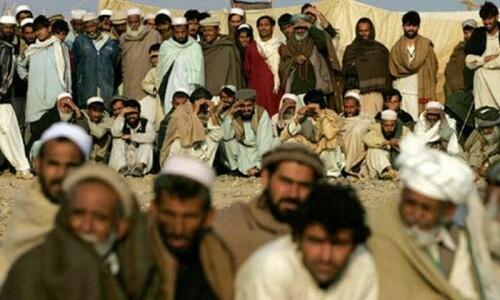KARACHI: Showing flexibility over his long-standing stance, Brahamdagh Bugti, the self-exiled leader of the separatist Baloch Republican Party (BRP), said in an interview on Wednesday that he was ready to give up his demand for an independent Balochistan if the Baloch so desired.
Mr Bugti, who had left for Afghanistan after his grandfather Nawab Akbar Bugti’s death in a military raid to lead guerilla resistance, spoke to the BBC on the ninth death anniversary of the nationalist leader. He made it clear that a peaceful resolution of the enduring conflict would not be without conditions.
While fleeing Afghanistan, he had alleged that Gen Pervez Musharraf’s regime wanted to kill him after eliminating his grandfather. He won refuge in Afghanistan despite Pakistan’s demand for his return and moved to Europe in 2010 along with his family.
With reports of hundreds of members of the banned militant organisations having surrendered in Balochistan recently and speculations rife that the authorities are negotiating with some exiled separatist leaders who want assurances of safety in return for giving up militancy, Mr Bugti’s peace offer indicates a radical change in Baloch politics.
“It is really hard to negotiate on the conflict when the bloodletting still continues. That’s why our standpoint is clear: the operation (in Balochistan) be stopped and all the forces be withdrawn. Once this materialises, it could provide conducive environment for dialogue,” Mr Bugti, who lives in Switzerland, said.
Until recently, the BRP chief had been a staunch opponent of a peaceful solution to end the conflict and refused to consider any way out other than a free Balochistan. He had repeatedly stated that time for reconciliation on the dispute afflicting the province had gone and thinking of such a prospect would never be on his agenda.
The publishing of the interview in sync with Interior Minister Chaudhry Nisar Ali Khan’s presence in London has intrigued quite a few observers.
The minister is visiting the British capital where he is expected to discuss, among other issues, the presence of certain Baloch separatists in the United Kingdom with the country’s authorities.
The government has recently sent out quite a few indications that it is giving serious thought to holding negotiations with Baloch leaders. The most notable was a meeting between the Khan of Kalat and Nawab Sanaullah Zehri, a PML-N leader, in London on Aug 15.
Mr Bugti rebuffed speculation that he had been contacted by the minister, but maintained that he wanted to resolve all the issues politically and in a peaceful manner.
“We are ready to meet him if he desires so because we are political people and want peaceful solution to the problems. Isn’t it silly when one says he wants to resolve the issues on table and we say no?”
He said he had been contacted several times in the past by the Pakistani authorities but none of those efforts was serious.
“Rehman Malik (former interior minister) had talked to us during the PPP government, but when we contacted (ex-president) Mr Zardari he said you should speak to ‘those’ people, whereas the army and the establishment did not want to talk to us,” Mr Bugti said.
He claimed the establishment had suffered a defeat in a way on the Balochistan issue and it would have to concede that its modus operandi was wrong and had to come forward for peaceful negotiations.
“What difference the bloodletting, arrests, enforced disappearances and decomposed bodies have made? Has it changed the Baloch mindset or hardened their stance?”
Asked what would be his reaction if the establishment called for withdrawal of the demand for a free Balochistan as a precondition for dialogue, he said: “We are ready to live with Pakistan if the majority of our friends, comrades, political allies and people desire it.”
Admitting that his strength was no match for the armed forces, he said the army wanted to solve every problem with might, which was a wrong tactic. “It was the army that had worsened the situation in Balochistan and it will itself get the situation better as well. Bloodshed and use of power will bring no good.”
Commenting on the allegation that his group was getting Indian assistance, Mr Bugti said “we won’t decline if India offers to assist us because everyone could seek assistance from anyone for defence”.
“We can seek help from the United Nations and America (United States) because it was not India that had asked for the operation in Balochistan. It shows that the establishment goes for such tricks only to hide its own failures.”
Published in Dawn, August 27th, 2015
On a mobile phone? Get the Dawn Mobile App: Apple Store | Google Play

















































